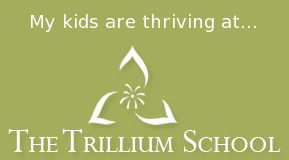Does your child need a different kind of education?
Jerry Mintz, founder of AERO, recently updated his helpful article: Ten Signs that You Need to Find a Different Kind of Education for Your Child.
Here’s a quick summary. First, the ten signs that your child may need a different kind of education:
- Declarations that “I hate school.”
- Difficulty interacting with people of different ages
- Unhealthy fixation on fashion
- Tiredness and crankiness
- Complaints about conflicts and unfairness
- Lost interest in creative expression
- Apathy toward subjects that were once exciting
- Procrastination
- Lack of excitement
- School recommendations for ADHD drugs
Mintz then goes on to cite a number of educational alternatives. Many parents aren’t aware of what might be available to them:
- Publicly-funded charter schools
- Montessori schools
- Waldorf schools
- Sudbury schools, and other democratic schools or “free schools”
- Public school alternatives:
- Public Choice/Schools within schools
- Public At-Risk
- Homeschooling:
- “School at home”
- Unschooling
For more details about the signs and the alternatives, see the original article: Ten Signs that You Need to Find a Different Kind of Education for Your Child.
It looks like you're new here. You may want to sign up for email alerts or subscribe to the "Lenz on Learning" RSS feed. Thanks for reading.


Hello Mr. Lenz –
I left a comment last year on one of your blog posts about the indignity and humiliation that children at schools face when they must first solicit permission to do something as necessary, and yet as private, as using the toilet. It’s amazing how many hidden civil rights issues there are everywhere you look! I wanted to say I’m making progress on that law school project of mine and will have some very helpful information to make available (for free) to parents everywhere after I graduate/pass the Bar soon (well, hopefully soon).
As for this post and another related one, I wholeheartedly agree about your theory of parenting that children should be in the environment where they thrive. I also think that in general, traditional compulsory education prevents children from thriving and growing. Different people thrive in different environments so I’m glad you have a perspective in this article about different types of schooling – some children do prefer some sort of school… Anyway I noticed that a lot of your ideas are supported in the book “Instead of Medicating and Punishing” by Laurie A. Couture. I’m a big fan of that book, and if you haven’t read it yet, I’d recommend it. And if you’ve actually already recommended that book in an earlier blog post, forgive me for not having read it yet!
I just wanted to say that in the last year since I’ve left that blog post, as well as commented on your slightly-taboo-sounding (but very thoughtful) “Permission to Pee” article, I’ve caught up on your posts and could not agree more with your notion that we really need to question the ethics and efficacy of current practices in children’s schools (including but not limited to, the grotesque human rights violation of denying children access to toilet facilities at school, and/or requiring children to first publicly solicit permission in order to perform a private, urgent, and yet taboo function).
But there are other major problems with forced schooling too. Personally, I’ve come to realize that the existence of a system that even allows teachers to restrict children’s access to toilet facilities and water fountains in the first place is what’s wrong. This broken system will still be in place, even if laws and successful education reform measures eventually outlaw that particular form of mistreatment. The same system that let a 13 year old girl get strip searched for advil will be there. The same system that serves trans fats in the cafeteria and cuts gym and art class. The system that confines children to a desk all day when research already shows that young people’s bodies are evolved to be in constant movement and outdoors. The system that forces teenagers to wake up before sunrise when we already know that their bodies need 9.5 hours of sleep a night and are programmed by circadian rhythm not to fall asleep until well after midnight. It will still be the system that pits children against each other in unnatural competition though grades, and still gives them homework that is irrelevant and draining to them when they could otherwise be pursuing their passions. And I think it’s beyond reform.
In my opinion, the best preparation for the real world is not one that trains people to be obedient automatons, but one that enables children to learn who they are, because that’s how they find a life path that’s meaningful to them. Traditional schooling does not encourage that kind of introspection.
I know you advocate for doing what makes the child honestly happy, and there are probably some people who could be and are happy with their school experience. But I think for the vast majority of people, traditional-style schooling won’t bring happiness for the above reasons. I’m glad your blog questions what learning really is for.